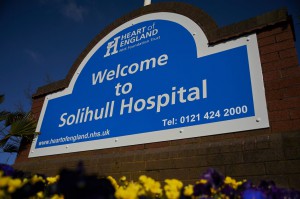8 August 2014
Public Health England (PHE) is monitoring the Ebola virus disease outbreak in West Africa. The risk to the UK remains very low.
Please read the latest Ebola Q&A document from PHE for more information.

All public documents relating to Ebola are available on www.gov.uk by putting ‘Ebola’ in the search box.
-ends-
You asked for correspondence from May 2010 to date regarding relocation of services away from Good Hope Hospital.
I have attached 3 documents in pdf format:
Dr Mark Newbold Chief Executive Heart of England NHS Trust (August 2010 – present)
3 letters attached: 03/03/2011 – re Physiotherapy, 22/12/2011 re Investment and 19/05/2014 re Surgical reconfiguration
030311 – MARK NEWBOLD to Andrew Mitchell MP re Physiotherapy Unit @ GHH
221211 – MARK NEWBOLD TO Andrew Mitchell MP re Good Hope Investment
190514 – MARK NEWBOLD TO Andrew Mitchell MP Reconfiguration
- Richard Parker Good Hope Managing Director supplied a comment but no documentation:
“I met with Andrew shortly after I started on 14 March 2014. This was part of my induction although our discussions around the hospital (including service reconfiguration) were widely reported on Andrews website.”
We do not hold any of the requested information from the following:
- Lord Hunt Chairman of NHS Heart of England Trust or his successor Les Lawrence who took over in June 2014.
- Sue Moore
- Any previous Managing Director of Good Hope Hospital
- Any previous Chief Executive. Mark Goldman was Chief Executive from 2001 – July 2010 and we hold no correspondence on this subject from him.
You might also be interested in a recent FOI we answered also on Good Hope Services.
In the spirit of openness there was one letter from a constituent of Andrew Mitchell MP to Mark Newbold which did briefly mention service relocation but this has not been included as it is covered under ICO guidance that a letter between a constituent and MP, passed to a third party for response, would not be expected to be passed on further. I can say that the response to Andrew Mitchell MP in this case is short and does not contain any material which is not covered in the letters attached above.
 The Tour de France may now be over, but it doesn’t have to end there. Heartlands Hospital is offering locals the chance to emulate Sir Bradley Wiggins and sign up to a cycling adventure from London to Paris!
The Tour de France may now be over, but it doesn’t have to end there. Heartlands Hospital is offering locals the chance to emulate Sir Bradley Wiggins and sign up to a cycling adventure from London to Paris!
The Hospital has launched Pedal with a Passion, a chance for local people to get on their bike to raise money for the Children’s Unit at the Hospital. The challenge takes place over four days, covers 300 miles, and two capital cities, finishing in the shadow of the famous Eiffel Tower.
Head of fundraising, Emma Hale, said: “This is a really exciting opportunity, whether you want to do it on your own, or as part of a team the money you raise will go directly to our youngest patients at Heartlands on items to help make their stay comfortable. Once you sign up we give you all the help and support you need to help you reach your sponsorship target.
“The ride takes place through the beautiful Kent countryside to Dover, before crossing the Channel and continuing through the rolling, green fields of Northern France, passing the war memorials and cemeteries of the Somme. The days will be long, but on reaching Paris, the feeling of accomplishment will be unbeatable!”
Global Adventure Challenges have been organising world-wide charity challenge events and adventures since 2000. Over the years, their teams have taken tens of thousands of people on exciting challenges all over the world, helping realise dreams and fulfill lifetime ambitions.
The Heart of England Charity supports patients, carers and families at Heartlands Hospital, focusing on raising money where it is needed most – in areas not covered or fully supported by NHS funds. It could be anything, from some new artwork in the children’s wards, to a piece of state of the art machinery.
Visit www.heartofenglandcharity.org.uk/challenges to sign up today! Call 0121 424 3838 or email fundraising@heartofengland.nhs.uk
You asked the questions below: We attach our answer in the format you required:3225
1) How many workstations (desktops, laptops and VDI clients) do you have on your estate?
2) Is your workstation estate covered by a desktop management and asset management software tool?
3) If so, which vendor and product (eg Microsoft SCCM, Novell ZENworks) do you use?
4) How many licences do you have currently under maintenance?
5) How many mobile devices (eg Smartphones, Tablets, Blackberry) do you support within your estate?
6) Do you have a management/enforcement product supporting mobile devices?
7) If so, which product/s do you use?
8) How many licences do you have currently under maintenance?
9) Which software product do you use for your IT and general service desk tool?
10) When is the renewal due on the maintenance?
11) Do your users make use of cloud-based storage services such as Dropbox?
12) Do you currently have a mobile and desktop file sharing solution that allows “Dropbox-like” functionality to your users?
13) If so, which vendor and product do you use?
14) What file transfer solutions (eg FTP, SFTP, SCP) are you using for moving files in and out of your organisation?
15) Do you run older (legacy/green-screen/main-frame) systems within your estate?
16) How do you connect to the older systems (eg terminal emulation)?
17) How do you integrate the older systems with newer technologies (eg GUI/NUI front-end making ODBC calls to older/legacy system)?
18) Which directory service/s (eg Active Directory, eDirectory, OpenLDAP etc) do you use within your organisation?
19) How many users, service accounts and groups do you have in each directory?
20) If you run multiple directories, do you synchronise objects between them?
21) If so, which software product do you use?
- Please provide details of the procurement process HEFT used to purchase the 247 Time service from G-Cloud, including the criteria asked for in the tender.
247 Time services are purchased via the national ‘G-Cloud’ suite of framework agreements. These are government tendered and managed agreements on behalf of the wider public sector. Further information on G-cloud is available via the following link. http://ccs.cabinetoffice.gov.uk/i-am-buyer/categories/ict/g-cloud
Please outline the service provided by 247 Time to HEFT, explaining the business model and identifying the deliverable elements of the contract.
Products services provided: 247 Time provide software via the ‘Software as a Service’ strand of the G-Cloud frameworks.
Model: Use of the software is charged on a ‘cost per hour booked basis’, this is in accordance with historic G-Cloud catalogue pricing .
Deliverables: The deliverables of the contract are in accordance with the G-Cloud catalogue- i.e. the supply of specific software and associated services as offered. There is no volume commitment by the Trust to the number of locum hours to be processed via the 247 Time software.
Further information on the 247 Time’s G-Cloud software and services offerings may be available via Crown Commercial Services (part of the Cabinet Office)
Please provide a breakdown of the evidence provided in the 247 Time HEFT case study, identifying what data was provided by the Trust for use in this document and what proportion of the savings are attributable to VAT efficiencies.
The document referenced in the question includes estimated savings and also includes those savings estimated to not arise directly from VAT efficient supply. The 247 Time software assists the Trust with cost transparency and the Trust is able to use the data gathered via 247 time and its own systems to compare historic data and forecast estimated savings.
. Does the Trust provide 24 hour fully staffed acute stroke diagnostic and treatment 7 days a week, 5 days a week, or other (please explain)? Yes 7/7
2. Does the Trust provide 24 hour routine access to scanning facilities for suspected stroke patients 7 days a week, 5 days a week, or other (please explain)? Yes 7/7
3. In 2013, what proportion of patients suspected of having a stroke received diagnostic scans (CT scans) within the first hour of having their stroke, as per NICE Clinical Guideline 68?
90.2%. (13/14 BPT) – Urgent Cases only
4. In 2013, what proportion of patients suspected of having a stroke received diagnostic scans (CT scans) within the first 24 hours of having their stroke?
96.4% (13/14 KPI)
5. Does the Trust provide 24 hour routine access to intravenous thrombolysis for stroke patients 7 days a week, 5 days a week or other (please explain)? Yes 7/7
6. In 2013, what proportion of patients confirmed as having a stroke received intravenous thrombolysis within the first three hours of having their stroke, as per NICE Clinical Guideline 68? I do not have a figure for patients thrombolysed at 3 hours as our window is within 4.5 hours of stroke onset. For that there is substantial variation month on month from 2-10%
7. Does the Trust record patient outcomes on discharge, based on the Modified Rankin Score?
The trust records data re admission, treatment and discharge in SSNAP
8. If the answer to question 7 was Yes, what was the score in 2013? N/A
9. In 2013, what proportion of patients were admitted to a specialist stroke unit within 4 hours of arriving in hospital?
46.1% (13/14 BPT)
10. In 2013, what proportion of stroke patients spent at least 90% of their time in hospital in a stroke unit?
83.9% (13/14 KPI)
11. Does the Trust provide ward rounds by specialist stroke physicians 7 days per week or the standard 5 days per week? 5 days at present though stroke expertise is available 7/7
What policy your Trust takes towards the employment of voluntary registered practitioners (for example does the Trust undergo any specific processes to check voluntary registers when considering applications from voluntary registered professionals)?
We don’t check registers for voluntary registered professionals. If the Person Specification has asked for a particular registration then we would normally check certificates at recruitment.
How many clinical physiologists work within your trust and do you require all of them to be members of the Registration Council for Clinical Physiologists (RCCP)? How many, to your knowledge, are currently registered with RCCP?
We have a total of 84 Clinical Physiologists in the categories mentioned. There are some posts at Senior level in Cardiology where we have asked for RCCP registration but we don’t have a central record of the number of staff involved.
What policies do you have in place to deal with fitness to practice or personal conduct concerns and complaints for healthcare professionals overseen by voluntary registers? Do you inform the voluntary registers of any concerns raised against such practitioners?
We don’t have specific policies relating to fitness to practice for voluntary register staff but we have formal conduct and capability policies for all staff and we would use these if necessary. If it was felt necessary to inform one of the volunteer registers of a serious issue then we would do so.
Summer is here and it is that time of year again when schools will be breaking up for the summer holiday and people will be planning to have outdoor barbecues. Whatever your plans are, it is important you protect yourself from the sun.
Most skin cancers are caused by overexposure to ultraviolet rays from the sun – did you know more than 13,000 people living in the UK develop skin cancer each year compared to 1,800 in the mid-1970s? People who are at risk of getting skin cancer include those who have pale skin, a history of sunburn or a family history of the disease.
Jacqui Jones, skin cancer clinical nurse specialist at Good Hope Hospital, highlights the three main types of skin cancer: “Basal cell skin cancer is the most common form of skin cancer and starts developing from basal cells. Basal cells are situated around the hair follicle and this type of skin cancer will develop mainly in areas exposed to the sun though it can develop anywhere on the skin.
“Secondly squamous cell cancer will also develop in areas that have been exposed to the sun. However squamous cell skin cancer will start in cells lining the top of the skin.
“Melanoma is a less common but serious type of cancer that begins in the skin and can spread to other organs in the body. More than 2,000 people in the UK every year die due to melanoma.”
Most cases of skin cancer can be cured and treated if found early. Radiotherapy and chemotherapy are the main treatments available to help treat skin cancer.
So what can you do to protect yourself from the sun and prevent skin cancer? Jacqui says: “Spend time in the shade when the sun is strong. Trees, umbrellas, canopies or buildings can all provide shade and help you protect your skin.
“Avoid getting sunburnt. Every time the skin is exposed to ultraviolet rays, this increases the chance of skin cancer occurring. You should apply a good sun protection factor (spf) sunscreen before you go out in the sun so the cream can be absorbed. You will need to apply sunscreen regularly if you are going to be spending time in the sun. You will also need to re-apply it if you have been for a swim.
“Wear clothes that provide protection from the sun if you are going to be working outdoors. This should include a hat to protect your face and scalp and sunglasses to protect your eyes.
“Lastly, avoid using sunbeds. Sunbeds can damage your skin and cause premature wrinkles.
“You can still go out and enjoy the weather but make sure you take steps to help protect your skin. Looking after your skin and making healthy lifestyle choices will help prevent skin problems.”
For more information on how to stay safe in the sun, visit the NHS Choices website at www.nhs.uk.
 An innovative partnership between Heart of England NHS Trust staff from Solihull Hospital and community, and Solihull Metropolitan Borough Council is giving patients with a range of lung diseases a new lease of life.
An innovative partnership between Heart of England NHS Trust staff from Solihull Hospital and community, and Solihull Metropolitan Borough Council is giving patients with a range of lung diseases a new lease of life.
Over seventy patients with chronic lung disease are now benefiting from weekly exercise sessions offered at Tudor Grange leisure centre, North Solihull sports centre and St George and St Teresa Catholic Church in Dorridge, after their pulmonary rehabilitation programme has been completed.
In patients with chronic lung diseases, physical inactivity is common and can lead to muscle de-conditioning and an increased risk of developing chest infections. By attending a pulmonary rehabilitation programme of exercise and education, they improve their capacity for physical activity and increase their understanding of how to manage their condition.
The exercise sessions now give patients additional help and support to continue to keep active and improve their quality of life after completing their hospital programme.
Stuart Lightfoot, respiratory physiotherapy outpatient lead, said: “Having a chronic respiratory illness can be very isolating, with symptoms varying day to day and affected by a multitude of factors.
“Working together with the professional fitness instructors based at the venues, the classes are helping to make people feel healthier and manage their conditions more effectively.
“Besides its therapeutic benefits, the course also allows patients to socialise, share experiences and make new friends.”
Alan Cuzick, aged 53 from Redditch said of the class: “Going to the class is an incentive to make the effort to get out and meet people. A bit of exercise also helps me to get out and keep moving. I enjoy it.”
Patients pay a nominal fee to attend the sessions, which enables the centres to cover running costs.
If you have a respiratory problem and feel you would benefit from the pulmonary rehabilitation programme, please discuss a referral to the respiratory physiotherapy outpatient team with your GP.
 Fete fever gripped Sutton Coldfield over the weekend as hundreds enjoyed some summer fun in the sun at Good Hope Hospital’s annual community event, raising nearly £1,000 towards equipment for the Hospital’s elderly wards.
Fete fever gripped Sutton Coldfield over the weekend as hundreds enjoyed some summer fun in the sun at Good Hope Hospital’s annual community event, raising nearly £1,000 towards equipment for the Hospital’s elderly wards.
Opened by Rt Hon Andrew Mitchell MP, the member of Parliament for Sutton Coldfield, there was something for everyone, including live music, tombolas, health awareness stands, bric a brac stalls and a wide range of children’s games and activities. Little ones were even encouraged to bring their teddy bears to the teddy bears’ hospital for a bit of tender loving care.
The competition was fierce at the popular dog show and the future Messi’s among those who visited the fete pitted their skills in a football penalty shootout competition. The luxurious Lamborghini Aventador and Bentley Continental GTC V8 S on display were admired by the crowd thanks to Bentley Birmingham.
Fitting with Royal Sutton Coldfield, there was a spread fit for the Queen at the afternoon tea party as well as a home-made cake stall and other delicious delights. And in the stocks was the Hospital’s managing director, Richard Parker, providing a bit of traditional fun.
Richard said: “The day was a great success bringing the local community, staff, patients and supporters together, a big thank you to everyone that came along and made the day possible. The Good Hope Hospital fete is an important event in the Hospital’s calendar. “It provides a great opportunity for us to open our doors for the community to come and see us and learn more about their local hospital whilst enjoying a great day out.”
For further information about the Good Hope community fete or if you would like to contribute to raising funds for the Hospital charity, Samantha Howell on 0121 424 2793 or email: samantha.howell@heartofengland.nhs.uk







